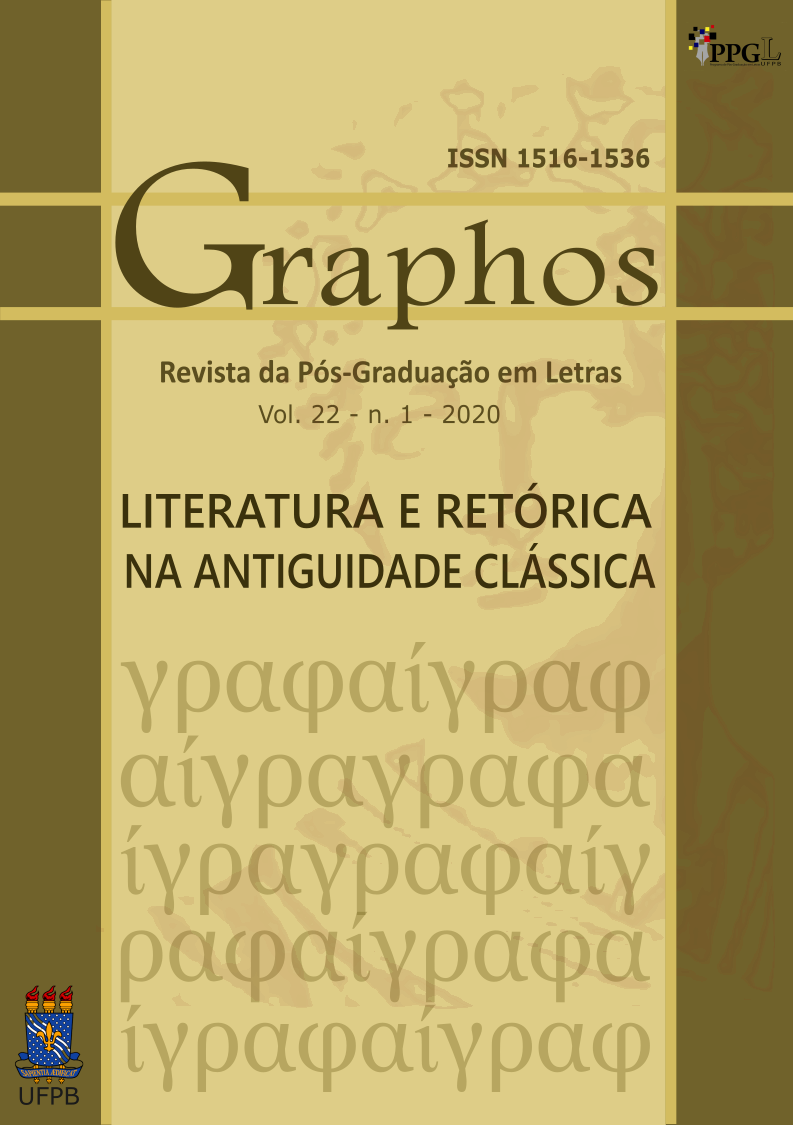Persuading and teaching Neoptolemus: Odysseus' rhetoric in the prologue of Sophocles Philoctetes
Keywords:
Odysseus, Neoptolemus, Rhetoric, Métis, SophistryAbstract
This paper aims to discuss Odysseus’ rhetoric in the prologue of Sophocles’ tragedy Philoctetes. The central position of Neoptolemus is examined to demonstrate how persuading him is the goal of Odysseus’ rhetoric. The article is composed by two sections: in the first one, “Odysseus’ métis: paths of rhetorical operability”, we discuss métis as the organizing principle of Odysseus’ speech, a basis for his persuasive tactics. In the second section, “Persuading and teaching Neoptolemus”, we analyze Odysseus’ arguments in the prologue and how he presents the power of speech in opposition to the use of force, making Neoptolemus discover rhetoric as an important tool in politics to direct people’s actions. Focusing on the prologue, we examine Odysseus’ role as a sophistic teacher of the arts of persuasion.
Keywords: Odysseus. Neoptolemus. Rhetoric. Métis. Sophistry.
Downloads
References
BLUNDELL, Mary Whitlock. The physis of Neoptolemus in Sophocles’ Philoctetes. Greece and Rome, v. 35, n. 2, p. 137-48, 1988.
_____. Helping friends and harming enemies: a study in Sophocles and Greek ethics. Cambridge: Cambridge University Press, 1991.
BRUNEL, Pierre (org.). Dicionário de mitos literários. Rio de Janeiro: José Olympio Ed., 1997.
BUXTON, R.G.A. Persuasion in Greek tragedy: a study of Peitho. Cambridge: CUP, 1982.
CHRYSOSTOMUS. Discourses 37-60. Cambridge: Harvard UP, 2001.
DETIENNE, Marcel, VERNANT, J-P. Métis: as astúcias da inteligência. São Paulo: Odysseus, 2008.
DHERBEY, Gilbert Romeyer. Les sophistes. Paris: PUF, 1985.
EASTERLING, P.E. Repetition in Sophocles. Hermes, v. 101, n. 1, p. 14-34, 1973.
FERREIRA, José Ribeiro. O significado da figura de Ulisses no Filoctetes. Humanitas, v. xxxi-xxxii, p. 115-139, 1980.
GASTALDI, V. El logos trágico y la funcionalidad de la retórica. Calíope, n. 12, p.72-83, 2004.
GOLDHILL, Simon. Reading Greek Tragedy. Cambridge: CUP, 1986.
HESK, Jon. Deception and democracy in classical Athens. Cambridge: CUP, 2000.
KIRBY, John T. The “Great Triangle” in early Greek rhetoric and poetics. Rhetorica: A Journal of the History of Rhetoric, v. 8, n. 3, p. 213-228, Summer 1990.
KIRKWOOD, G. M. A study of Sophoclean drama. Ithaca: Cornell University Press, 1958.
KNOX, Bernard. Philoctetes. Arion, v. 3, n. 1, p. 42-60, Spring 1964.
LORAUX, Nicole. Maneiras trágicas de matar uma mulher: imaginário da Grécia antiga. Rio de Janeiro: Jorge Zahar Editor, 1988.
MAZON, Paul. Notice. In: SOPHOCLE. Tragédies: Philoctète – Oedipe à Colone. Paris: Les Belles Lettres, 2002, p. 01-07.
MONTIGLIO, Silvia. From villain to hero: Odysseus in ancient thought. Ann Arbor: University of Michigan Press, 2011.
PUCCI, Pietro. Odysseus Polutropos: Intertextual Readings in the “Odyssey” and the “Iliad”. New York: Cornell University Press, 1987.
REINHARDT, Karl. Sófocles. Brasília: Ed. da UnB, 2007.
ROSE, Peter. Sophocles’ Philoctetes and the teachings of the sophists. Harvard Studies in Classical Philosophy, v. 80, p. 49-105, 1976.
ROSENBLOOM, David. Staging rhetoric in Athens. In: GUNDERSON, Erik (ed.). The Cambridge Companion to Ancient Rhetoric. Cambridge: CUP, 2009, p. 194-209.
STANFORD, W. B. The Ulysses Theme: A Study in the Adaptability of a Traditional Hero. New York: Barnes and Noble Inc., 1964.
VAZ PINTO, Maria José. A doutrina do logos na sofística. Lisboa: Colibri, 2000.
_____. Os sofistas e a sofística. In: VAZ PINTO, Maria José; SOUSA, Ana Alexandre Alves de (eds.). Sofistas: testemunhos e fragmentos. Lisboa: Imprensa Nacional, 2005, p. 11-39.
VERNANT, J-P.; VIDAL-NAQUET, Pierre. Tensões e ambiguidades na tragédia grega. In: _____. Mito e tragédia na Grécia Antiga. São Paulo: Perspectiva, 1999, p. 07-24.
VIDAL-NAQUET, Pierre. O Filoctetes de Sófocles e a efebia. In: VERNANT, J-P.; VIDAL-NAQUET, Pierre. Mito e tragédia na Grécia Antiga. São Paulo: Perspectiva, 1999, p. 125-145.







